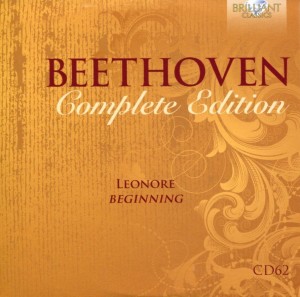 I am now listening to Beethoven’s opera.
I am now listening to Beethoven’s opera.
I’m up to CD 62 and this is the first time voices enter the scene.
There’s a reason for that.
Beethoven only wrote one opera.
Here’s the poop on Fidelio, according to its entry on Wiikipedia:
Fidelio (Leonore, oder Der Triumph der ehelichen Liebe: Leonore, or The Triumph of Married Love) (Op. 72) is a German opera with spoken dialogue in two acts by Ludwig van Beethoven. It is his only opera. The German libretto was prepared by Joseph Sonnleithner from the French of Jean-Nicolas Bouilly, which had been used for the 1798 opera Léonore, ou L’amour conjugal by Pierre Gaveaux, and the 1804 opera Leonora by Ferdinando Paer (a score of which was owned by Beethoven).
The opera tells how Leonore, disguised as a prison guard named “Fidelio”, rescues her husband Florestan from death in a political prison.
Frankly, I’ve never been a fan of opera. Much (most? all?) of it is dreck.
So, I’m usually wincing by the time one of my musical explorations enters the realm of opera.
Today’s foray into the world of opera is different for several reasons:
1. It’s Beethoven. So the music leading up to the singing is very good. It’s holding my attention.
2. This is Beethoven’s only opera, which gives it the weight of importance (at least in my mind).
3. It’s in German, which is a language that never fails to make me chuckle.
NPR posted a good review/commentary of Beethoven’s Leonore. Here’s an excerpt:
For ages, Leonore was viewed as little more than a flawed first draft of Fidelio. But over the last decade or two, interest in Beethoven’s earlier version has increased, even resulting in several recordings.
Some conductors who have taken interest in Leonore, like Nicholas McGegan (who conducts this concert), feel that the emotional content of Beethoven’s earlier version is more pure, intense and immediate.
The opera is imbued with Beethoven’s vision of freedom from political oppression, sparked by the ideals of the French Revolution. One writer described it as the story of “a woman, disguised as a prison worker, who liberates her husband, and strikes a blow for freedom, feminism, and prison reform.”
This recording is remarkably clear and clean. Every nuance is captured. The performers are superb. And that’s a biggie for me. There’s a certain range of voice that grates on me like fingernails on a chalkboard. For women, it’s a mezzo-soprano voice, a mid-range voice that reminds me of an old-timey lady in a church choir.
That’s not a concern with this opera. Edda Moser (Leonore) has a wonderfully powerful voice with a tremendous range.
Here’s a little about her from the entry on Wiki:
Edda Moser (Frau Kammersängerin) (born 27 October 1938) is a German Coloratura soprano. She was particularly well known for her interpretations of music by Mozart. Her 1973 recital LP “Virtuoso Arias by W. A. Mozart” received the Grand Prix du Disque.
Moser was born in Berlin, Germany, she is the daughter of the musicologist Hans Joachim Moser. She studied at the Berlin Conservatory with Hermann Weissenborn and Gerty König and made her debut as Kate Pinkerton in Madama Butterfly at the Berlin Städtische Oper in 1962. After singing in the Wurzburg Opera Chorus from 1962 until 1963, she sang at the opera houses in Hagen, Bielefeld, Hamburg and Frankfurt, before joining the Vienna State Opera in 1971. She also sang in Salzburg.
She made her American debut in November 1968, when she appeared at the Metropolitan Opera, in the role of Wellgunde in Das Rheingold.
Soprano Helen Donath (who plays Marzelline) is a name I’ve encountered before in my musical journeys.
It’s a rare treat to hear these two gifted sopranos sing together, as they do on Track 20 (“No. 10 Duetto: Im in der Ehe froh zu leben”). Truly, that’s a thing of beauty.
Another fine voice belongs to Theo Adam, bass, who plays Don Pizarro in Leonore.
This performance of Leonore was recorded in 1976 in Dresden.
Musicians and choir were:
Rundfunkchor Leipzig
Staatskapelle Dresden
Herbert Blomgstedt conductor
It may pain me to type these words but…
Leonore is quite good. The music is compelling. The performances are top-notch. The story isn’t that hard to follow. And the recording is superb.
I could see myself listening to this again, by itself. Like, “Hey! I’m in the mood to listen to an opera. I think I’ll pop in Leonore.”
seriously. I mean it.
